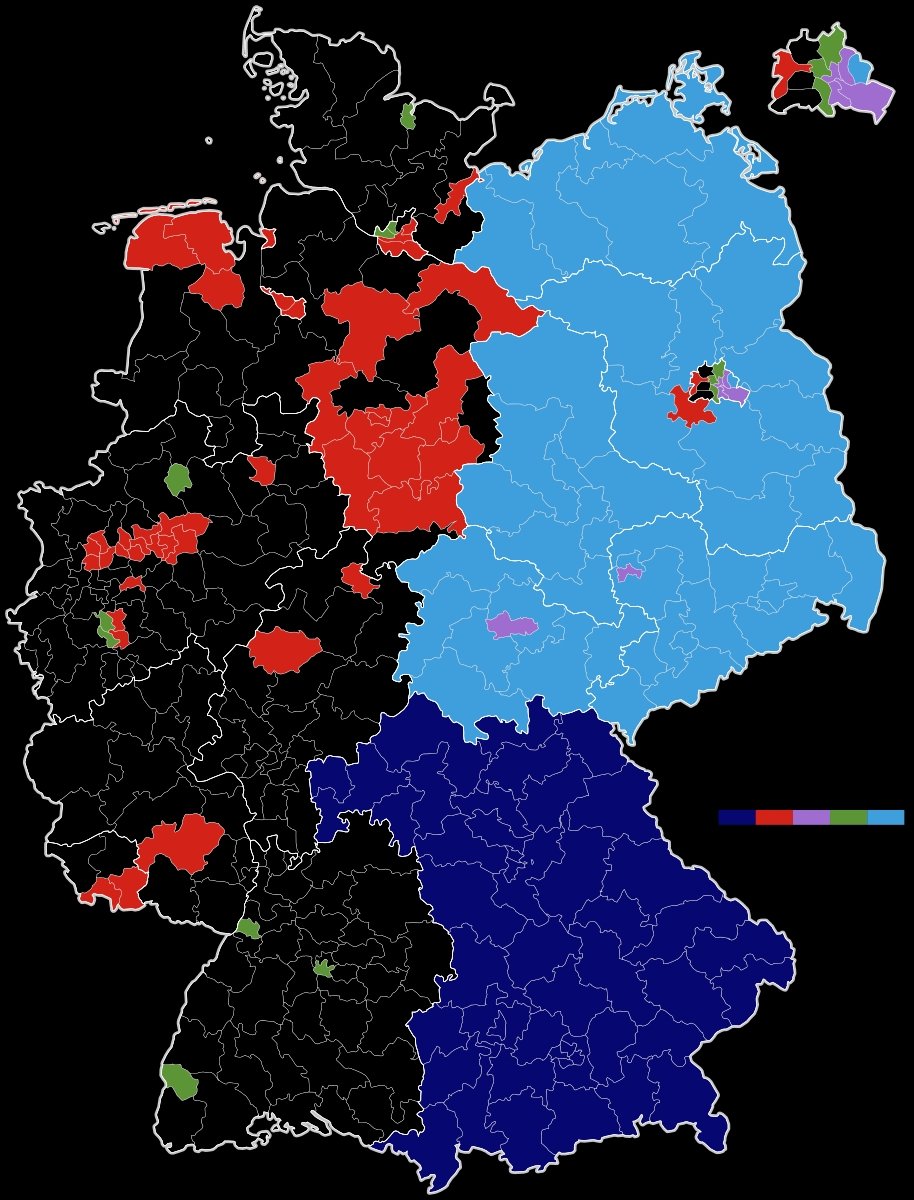- cross-posted to:
- [email protected]
- cross-posted to:
- [email protected]
Please note that in Germany you get 2 votes in the federal election. 1st is for a candidate to directly represent your district, 2nd is for a party nation wide. The map only shows the election result for the 2nd vote.
Here’s another map to show the party affiliation of winners of the 1st vote:

Colors are the same, except blue. Blue represents CSU, essentially the Bavarian version of the CDU (Christian Democratic Union).
For anyone interested in psephology or electoral systems, the system Germany uses is called Mixed-Member Proportional. It mixes the benefits of FPTP (having a local member who is your local area’s most liked candidate) with proportional systems (having the overall Bundestag proportionally representing the will of the people).
The system is pretty neat, but it does come with some issues. See all those dark blue districts in Bavaria? That’s way more seats for the CSU than they would be entitled to by the proportional representation.
Previously, these “overhanging mandates” were handled by simply increasing the size is Parliament until proportionality is met (“compensate mandates”). This was fine for decades, where there were always only a couple of those. But as CSU votership dropped (among other things), we were looking at more than 200 additional MEPs (in a parliament of officially 598 seats).
So it got reformed. Parliament now has a fixed 630 seats. The “overhanging mandates” get dropped based on the margin by which they won their electoral district (with some sorting by state mixed in). Most of those districts still got their representative via the party lists, but there actually are 4 districts that are unrepresented now. So it’s not a perfect system either.
The way overhangs are handled is one of the key differences between Germany and New Zealand, as I understand it. New Zealand makes no effort to level its parliament, and simply accepts overhangs as a distortion of the pure proportionality. I like the simplicity of it, but for fairness I think Germany’s system is probably better. The new system is almost like the inverse of how I suggested party seats should work, which I quite like.
One thing I don’t particularly like is the 5% minimum both countries use. It’s not unreasonable to have a minimum I think, but it’s unfortunate for all the voters whose vote is essentially wasted because they didn’t support a popular enough party. It’s a less severe version of the problem FPTP has, IMO. Over 13% of voters had their vote completely wasted in last weekend’s election. It’d be nice if there was, like, a preferential system, where if your first choice of party doesn’t get 5%, it can go to another party of your choice instead. BSW voters, for example, might have chosen to give their vote to Linke, and FDP voters to Union. So the end result would have been:
- Union: 207
- AfD: 131
- SDP: 103 or 104 (depending on rounding)
- Grune: 73
- Linke: 86 or 87
- SSW: 1
- Plus more to whichever of those parties the 28 seats’ worth of “other” voters gave their 2nd preference to
I’ve also often been curious how it would work if the local seats were elected not by FPTP but by IRV. Would that have a positive or negative effect on the representation, or not really have much effect at all? I don’t think any place has done it, and I don’t even know if anyone has seriously sat down and theory-crafted it.
This sort of ranked choice voting would be a pretty good solution to the issues with the 5% barrier.
It would also empower small parties like Volt or ÖDP, especially in terms of party funding (which is tied to election results).
Although tbh, BSW (which are openly pro Russia, so their ranked choice might have been AfD) and FDP (whose understanding of their oft-touted economy is on the level of a second semester econ major with a trustfund) not making it into Parliament this time is the best thing about these otherwise pretty terrible eleven results.
Thanks for the new word, I like it!
It’s the one people talk about most for a new Canadian system, but honestly it just seems unnecessarily complicated to me. It’s a minority that can even name their representative.
I actually really like it as a system. Though I prefer a version where instead of using a party list you use the “nearest loser” to decide who fills the proportional seats. It or STV (though preferably on a slightly larger scale than how Australia currently uses it in our Senate—electing 10–20 representatives per electorate rather than our 6) would be my favourite systems.
MMP, if we’re comparing it to a fully proportional system, has a few distinct advantages. Many but not all relate to it having a local representative. You might not know who yours is, but plenty of people do. Even if you don’t though, having one specific person be your primary contact with politics is useful when public pressure campaigns happen. It’s easier to say “write to your MP” than to say “write to a whole bunch of MPs. Which ones? I dunno, all of them I guess?” It also means you have a politician who is specifically supposed to help look after your area’s needs. Who can push for local infrastructure upgrades etc.
It also gives you the option of doing something other than party-list proportional representation. If you don’t do local representatives, the only feasible way to decide which MPs are elected by each party is for the party to decide. Which, IMO, I don’t like. If a party puts someone near the top of their list who is deeply unpopular, despite the party as a whole being popular, voters should be able to say “nah, not him”. With MMP, you can use a system like “nearest loser” where the people who get elected via the proportional system are the people who came closest to winning in their local seat, demonstrating that, out of the people who were not directly elected locally, they are at least the most popular in their electorate. I don’t believe either Germany or New Zealand actually do this, but it’s at least an option.
I say we do a zero-representation system. No one gets elected. No kings either. Government posts are filled by sortition.
No one who most desperately wants power should have it. Solve this problem by filling offices through a lottery. I’m in the US, and I personally think we would be doing a hell of a lot better with a Congress made from 535 randomly selected Americans than the 535 we have up there right now. Or maybe some sort of hybrid system, where you get to choose between a few randomly selected candidates.
I unironically really like the idea of sortition. I’m not convinced it could or should make up the totality of all governance, but for at least broad strokes/high level decisionmaking I think a group of random people given access to a variety of expert opinions and the resources to help consult more broadly could come up with something that is genuinely a good outcome. I’d especially like to see it tried out at the local level, around things like development approvals/zoning laws, street design, locations of parks, libraries, and other public facilities, and the other important work done by councils. I believe the power of local people making decisions about their local community would be a really powerful way to get around NIMBYs.
Yeah, it’s definitely something that would need to be experimented with locally first. I mainly like the idea because it removes the ability for the most depraved and power-hungry people to achieve high office with any frequency. The real problem with power is that it attracts evil people like moths to a flame. They seek power for its own sake. Not because they have a vision of how to improve the world, or because they want to help people. They simply want power over other human beings. I’m firmly convinced that any presidential candidate for instance is almost certainly almost demonically evil. You simply don’t get to that level of power and influence, in our current system, without leaving a whole bunch of bodies along the side of the road on your path to the top. You have to cheat, betray, lie, and stab people in the back. You have to abandon your closest supporters in the name of political expediency. You have to hide your real beliefs lest you angering the wrong people. Our existing system just selects for the most dishonest and evil sociopaths among us. The higher the level of government, the more depraved and evil you can expect the politicians to be.
Sortition solves this problem entirely. I like the idea of maybe just using it to select 3 candidates. That way the voters can hopefully prevent the real crazies from winning office, if one happens to have their lot drawn. Just by voting, you probably can’t weed out a power monger that happens to get picked randomly for a presidential candidate slot. But you can at least prevent the legitimately crazy person whose campaign platform is just, “I’m going to launch all the nukes the minute after I get sworn into office.”
But with sortition, you prevent the worst of the worst from ever getting into the halls of power. Look like someone as sociopath and conniving as a Mitch McConnell. That man should have never been let anywhere near high office. But he wormed his way to the top. With sortitition, the only way he would ever see office is if he managed to win a million:one odds lottery first.
I think that generally, most people are good people. And yes, as you alluded to, they likely will need to rely heavily on expert opinions. But elected leaders already do that. But most people do want to seek compromise and work for the greater good.
As a plus, this would completely kill political parties as we currently know them. You don’t need the party to win election. And if each representative only serves a single term, there’s really nothing to be gained by sticking to a persistent political alliance like a party. Better for representatives to just form ad hoc coalitions as they go through their terms.
Whoops, late reply. Sorry.
it removes the ability for the most depraved and power-hungry people to achieve high office with any frequency. The real problem with power is that it attracts evil people like moths to a flame
I genuinely believe a lot of people get into politics for the right reasons. Some of them might have bad ideologies, but they genuinely believe they can make a difference for good. But the political system works against this goal, exactly as you describe.
Sortition solves this problem entirely. I like the idea of maybe just using it to select 3 candidates. That way the voters can hopefully prevent the real crazies from winning office, if one happens to have their lot drawn
To me, sortition works best in situations where there isn’t just a single person. You don’t do sortition for president, you do it for a council, a parliament, an inquiry, a board, or, obviously, a jury. That, by its very nature, prevents the one crazy from taking charge and causing havoc.
I do think there are some issues with sortition when it comes to providing actual leadership. It’s a great approach to figure out what policies to go for, but who does foreign diplomacy? Who meets leaders of other countries? Who makes hard in-the-moment decisions in times of war? In some circumstances, there is an actual advantage to people with experience being at the highest rungs of politics. I’m sure there would be a way to deal with that in sortition, but it’s at least worth considering.
You might not know who yours is, but plenty of people do.
To be clear, I’m in politics “like a dirty shirt”. I definitely do. Most people I know wouldn’t off the top of their head, and the people who’s doors I knock on are prone to not even understanding that there’s multiple levels of government.
It’s easier to say “write to your MP” than to say “write to a whole bunch of MPs. Which ones? I dunno, all of them I guess?”
That’s definitely true. My local guy uses those letters as toilet paper, probably, but the ones in unsafe ridings or who are young and idealistic might actually care. I have to assume there would be alternatives that grow up, though, including petition signing which is already quite prominent here.
As for keeping out unpopular individuals, that’s true, although Justin Trudeau himself is the only person in my country right now with that kind of notoriety.
I’m shocked AFD is eastern
I’m not. Populism thrives when people are dissatisfied and angry. East Germany is economically not as strong as the west, despite decades of reunion.
Sounds like it’s following in America’s footsteps, where rural and rust belt regions were kinda left behind by the federal government. The south is more complex but similar.
deleted by creator
Soviet brain damage lingers on.
Many East Germans long for the DDR. It’s not surprising they vote for a party that wants to undermine democracy.
Taking the ex-communist countries as a whole, my impression is that forced social progress gets in the way of real social progress. Add a shitty economy on top of that, and you have fertile ground for fascists.
I read a long time ago that the divide was quire real in germany, the esteners had bad education (thank you Soviet Union) and were generally way poorer than the rich west germans, which lead to all kind of problems and the east germans felt like slave workers for the rich BMW drivers.
I don’t know how much that played a role in the election but I sure think it’s a breeding ground for a populistic party …
Unfortunately capitalism completely exploited the remains of the DDR: https://en.wikipedia.org/wiki/Treuhandanstalt
“Bad education”? WTF are you talking about? The east experienced a full-on brain-drain after the borders were dissolved and the people who stayed got screwed by the Treuhand.
You’re talking about scientists I guess, I was referring to the global population that learned state planned economy and russian instead of English for example.
But I’m not here to lecture anyone, thanks for the feedback.
… so you’re saying that learning russian, instead of english makes you dumb? O.o
And don’t get me started on economic education. If I’d judge the intellect of a person based on their understanding of economy, then I’d never stop to wonder how so many people were able to put their pants on in the morning.
Sad to see 1/3 of german voted for nazi in both local and federal vote.
20% is 1/5. It is still too much but not the end. 80% did not vote for them. And the left go stronger too and keeps growing. This is the beginn of the fight, not the end.
Edit: I take it back. FUCK THE CDU!
Get vicious with nazis early on, if you are truly sure they’re nazis. Don’t want Germany becoming the next Nazi America.
We are on it. There are several efforts, including high-profile ones, to ban the AfD. At the same time, we are fighting fascism on all fronts, online and offline.
It’s funny to see Berlin, a Linke haven, lost in a huge sea of nazis.
“Extremes” both sides, ie. the Nazis and the Left party, are more popular in the east, no doubt because it is poorer, so people are less satisfied with the status quo.
It looks like it’s just West-Berlin + a suburb of West-Berlin, while the rest of old East-Germany went fascist.
Edit: I had misread the map when I made the above comment. The CDU in West-Berlin are not the only non fascists, East-Berlin has not gone fascist, but mostly went for Die Linke.
CDU is not fascist, it’s center left.
Edit: I meant center right. Still, not fascist.
I think you meant center right
https://en.m.wikipedia.org/wiki/Christian_Democratic_Union_of_Germany
SPD is center left
Oops yes I meant that.
?
I said East-Germany went fascist. On the map CDU rules the roost in West-Germany and west-berlin, so I never said that I consider CDU to be fascist.
I thought you meant the rest of Berlin went fascist too?
Sorry, I apparently had misread the map, I thought east-berlin had mostly gone afd as well. The color of Die Linke had blended in with the color of afd, so it had seemed like it was just an island of black colored west-berlin in a sea of afd.
And yes, I’m partially color blind, which isn’t an excuse, but might explain it a little.
The eastern most district did go fascist, but that’s not surprising.
Leipzig similarly
“The planet is fine - the people are fucked.” George Carlin
There’s the 1/5 AfD and 1/4 Union. Maybe the westies start to take the socio economic discrepancies between them and their eastern counterparts serious.
If you’re wondering what the AfD districts in the West were: Gelsenkirchen in the north and Kaiserslautern in the south.
The most notable thing in Kaiserslautern is Ramstein air base and friends. I guess the military votes far-right.
I have no idea what’s up with Gelsenkirchen. SPD came second with CDU just behind, so maybe it’s what would be vote splitting in a dumber electoral system. As it is, the map is just a map.
You can find an interactive version here.
Gelsenkirchen is a traditional working class area, which used to be secure SPD heartland. SPD has lost voters massively to AfD among workers over the years, including among the immigrant working class.
Soldiers in Germany tend to vote CDU. The last couple of years the head of the Bundestag’s defense commission Marie-Agnes Strack-Zimmermann from the FDP was super popular. In the past SPD was also really strong. These two polls on the Bundeswehr subreddit have FDP and CDU together with a supermajority. Now that’s of course not representative, but gives you an idea that the military doesn’t vote far right.
including among the immigrant working class.
Really?? That doesn’t seem possible, since people tend not to vote for candidates that openly hate them. Do you have a source?
Soldiers in Germany tend to vote CDU. The last couple of years the head of the Bundestag’s defense commission Marie-Agnes Strack-Zimmermann from the FDP was super popular. In the past SPD was also really strong. These two polls on the Bundeswehr subreddit have FDP and CDU together with a supermajority.
That makes sense. CDU is (by German standards) strong on defence, even I know that.
Now that’s of course not representative, but gives you an idea that the military doesn’t vote far right.
I was reminded of the scandals relating to Wehrmacht idolisation, but I have no idea how how widespread a problem that is, so I’ll defer to you.
https://taz.de/Tuerken-fuer-die-AfD/!5449750/
This is about Germans with Turkish background. It’s the same as in other countries: We came here legally and are law abiding taxpayers. These illegal newcomers are criminals and ruin the image of all immigrants. It’s about law and order and strong leadership. If you vote Erdogan in Turkey, AfD is closest in Germany. The Grey Wolves are the biggest right wing extremist organizations in Germany as well, so keep that in mind.
German-Turks are also specifically targeted like in this video by Krah appealing to nationalist sentiments and referring back to German-Turkish alliance going back to WW1.
scandals relating to Wehrmacht idolisation
Yes, this happens from time to time as does other crap. The severity of these cases varies.
In 2023 the Bundeswehr let go of 62 soldiers, among them 10 officers, for extremism. It’s not just nazis, but also for example anti-vax conspiracy nutters. I don’t have any comparisons of these numbers to other armed forces.
The Bundeswehr emphasizes democratic values and educates people along their principles of Innere Führung and Staatsbürger in Uniform. For example that soldiers are ultimately serving their conscience is stressed. Structurally the Bundeswehr also has differences to other militaries. There are no separate military courts for example. Crimes involving soldiers get dealt with by regular courts.
In 2019 about 15% of soldiers have immigrant parents or immigrated themselves. Of course they can be extremists just as well.
Interesting! I found this study with an actual table of migrant political support by origin: https://www.dezim-institut.de/fileadmin/user_upload/Demo_FIS/publikation_pdf/FA-6235.pdf
Unfortunately Turks get lumped in with MENA in this one, and it comes out to around the the same as for other groups - probably because support from those derived from the rest of the Islamic world is low.
I can’t actually read German, but from the percentages not adding up I assume this is some kind of favourability rather than voting intention, and it still comes out to just 20% or so.
US Military can’t vote in German elections. The only voting population involved with the military would be NATO Aircom and even that German population would be small compared to the 80%+ turnout.
Lippe which includes GFM-Rommel-Kaserne voted CDU with 27%.
Even in Grafenwöhr CDU was around 27%.
I kind of assumed there’d be lots of German servicepeople on those bases too. Interesting that it doesn’t work that way.
So why do you think Kaiserslautern went AfD?
I want to say the anti American sentiment but also Kaiserslautern is the 2nd stop in Germany from France (first being Saarbrücken). So there may be anti immigration influence.
Additionally Kaiserslautern has lost a ton of manufacturing capabilities with the withdraw of Pfaff and Opel in the area may have caused many loss of jobs and general upset of the population.
Können wir bitte die Mauer wieder aufbauen?
Um jede Großstadt, die nicht schwarz oder blau ist?
It looks dramatic, but afaik the old GDR states have much lower pop and density. Unless germany starts some funny business with electors and whatnot, i daresay this is not that bad of a result.
It is so striking where AfD is popular thought.
A long time ago I visited one of my parents’ friends in East Germany with them, and I said something about how it was good that Germany reunified after the wall fell.
My parent’s friend said, people here don’t think it was a good thing. People here felt like they lost the war.
I never realized that was a thing.
When you grow up in west Germany, you kinda never realize that the GDR was basically annexed by west Germany.
The majority of people in the GDR actually didn’t want to turn capitalist, but they rather wanted another, more liberal form of socialism. Also, the Treuhand basically destroyed the east German industry which was then bought up by the West.
So, actually the “finally reunited” narrative is the one that’s overly romantic, not (only) nostalgia for the GDR.
That all makes sense.
Another “story” I’ve heard is that the East German factories were basically years behind in safety and efficiency and environment harm, and so a lot of them were shuttered after unification. Was this the Treuhand?
The job of the Treuhand was it to check if a business were able to survive the transition to capitalism; most weren’t so they were closed. The problem is that many people in the GDR believe that they were scammed by the west, when in reality they were scammed by their own government for decades.
They were scammed. The exchange rate of the Ostmark to the DMark was great for consumption, but made etern businesses unsustainable. They were then bought up by sleazy investors for a pittance.
You can say about political liberties in the GDR what you want, but domestic production was actually really good over there.
wanted another, more liberal form of socialism
How is AfD helping?
That’s a very distant phenomenon and more a result of the economic misery the east Germans have been experiencing for the last 35 years than a yearning for socialism.
Also, the east was targeted for neonazi agitation by westerners after the wall fell.
Credibility to forward east german interests
On this subject, I really recommend the documentary “A perfect crime” from Netflix.
On top of that, East Germany didn’t get the investment they were promised after unification. I don’t think it is a coincidence that the people who didn’t live under Neoliberalism 40 years ago are rejecting it today.
Interesting, indeed. Maybe it’s a form of nostalgia? We still have plenty of people missing the comunists in my country, usually folk that had it better during the regime. But I never heard “we felt like we lost the war”.
Any chance that NATO skepticism is a big issue in East Germany, and the actual appeal of AfD?
Reuters has an interactive map where you can see the percentages for each district
Shows a bit more of a positive view in the sense if your looking at this as an American and think AFD got a majority in all east Germany, they didn’t, the bluest areas are 40-44% percent while most are at around the 32-36%, but they got the plurality. A bit depressing though in that all of west Germany they’re taking 15-20% which this map doesn’t show well
Based Aachen! 💚
Downvote me more please.
You can’t display a map like this on map enthusiasts that gives a false representation of the election based on land area instead of population density and not be called out on it. It’s a shit way to represent data and sows more discord than gives the proper story of what happened
Hmm, that’s true.
Actually, if this wasn’t a map community I’d be more worried. In theory people here will know maps hide heterogeneity.
I think the Elsson here is that east Germany is still very much a Russian subject tbh
Iron curtain still alive.
I think it’s time to unreunite Germany.
What was that line from WWZ again?
So, will the German Nazis use the same playbook as the American ones and claim that the election was rigged?
Unlikely, they’re happy with their result.
It’s however possible that the conservatives will run the Austrian playbook. Talks with the social democrats fail, “we have a responsibility to Germany to form a government”, then make a coalition with the AfD (Nazis).
Back to your original question: the BSW will likely contest the elections, as they have missed the 5% threshold by only ~14k votes and there are evident irregularities. For example, many Germans living abroad, for example those living in the US, had almost no chance to cast their vote.
Talks with the social democrats fail, “we have a responsibility to Germany to form a government”, then make a coalition with the AfD (Nazis).
That feels familiar somehow.
Very unlikely. A coalition with the AfD is rejected by 85% of CDU voters. Merz has many times unequivocally rejected a coalition with the AfD.
there are evident irregularities
The only irregularity is voters abroad having received their mail in ballots too late. That was caused by the short timeframe to prepare the early elections. If that qualifies as a problem will be decided by the courts.
then make a coalition with the AfD (Nazis).
It only adds up to 48%. The other parties would band together to make 52%.
Nope, you have to compare seats won, not percentages. Conservatives + Nazis would be 360 seats of 630 total, creating a majority.
Election denial is less scary if they only have 20% support. If they tried it I imagine the vote to ban them would come back and maybe get enough support this time.
You caneven see the big University cities in Germany: cologne, Münster, Aachen.














